The Best Municipal Software
In our guide to the top municipality software, we cover systems that simplify budgeting, citizen services, and asset management for cities and local government agencies.
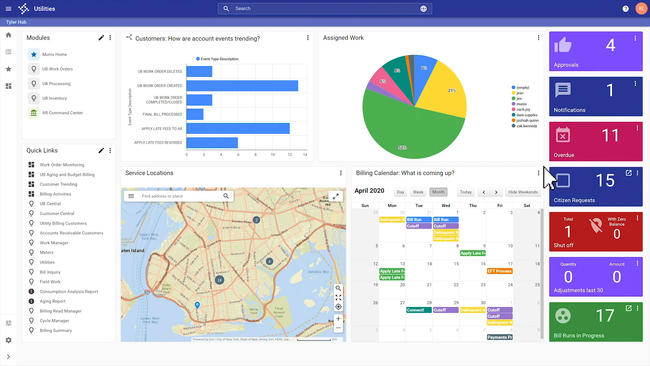
- Drag-and-drop tools to customize data visualization
- Exports data to Microsoft Excel
- Simplified property and asset management through GIS integration
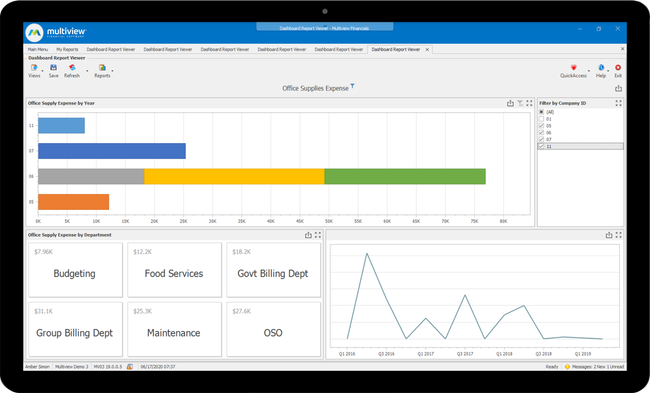
- ViewPoint tool offers strong reporting and analytics
- Scalable, user-based pricing model
- Includes 18 fully integrated modules for different industries
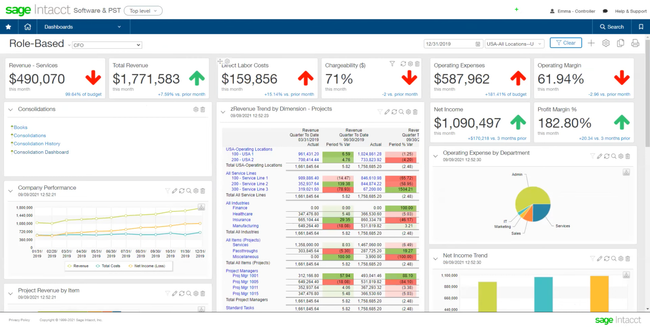
- Multidimensional reporting capabilities
- Scalability for multi-entity support and user growth
- Simple and responsive user interface
Municipal software is a financial management tool designed to help manage processes such as utility billing, tax collection, and permitting. We used our advanced review methodology to review top solutions for government agencies, public sector organizations, and municipalities.
- Enterprise ERP: Best Overall
- Multiview: Best for Mid-Sized Agencies
- Sage Intacct: Best Integration Options
- OpenGov: Best Budgeting Tools
- CitizenServe: Best Online Permitting System
- CloudPermit: Best for Local Governments
- Caselle: Best Customization Options
- AccuFund: Best Reporting Tools
- Edmunds GovTech: Best for Small Municipalities
Enterprise ERP - Best Overall
Enterprise ERP, formerly Munis by Tyler Technologies, makes budgeting smarter by aligning spending with public needs. Instead of simply adjusting last year’s numbers, its priority-based budgeting tool leverages AI and machine learning to assess financial data and spot cost-saving opportunities. This gives you a structured, data-driven way to put resources where they matter most.
It starts by breaking municipal services into individual programs; from there, it calculates direct and indirect costs to give you a full picture of where your money is going. If you need to find alternative revenue sources, Enterprise ERP helps identify those while tracking grants and external funding streams. This helps you maximize every dollar.
Enterprise ERP then assigns performance metrics to measure impact; it uses data visualizations to show whether spending is achieving your desired results. Built-in scenario planning tools help you project long-term financial sustainability. You can also generate interactive reports, making it easy to share budget insights with the public. In addition to reducing FOIA requests, this ultimately helps you build trust with your constituents.
Multiview - Best for Mid-Sized Agencies
Multiview is a good option for medium to large-scale municipalities because of its scalability and wide range of modules. Beyond the core accounting features, Multiview offers advanced modules like business intelligence, which gives consolidated reports with real-time data. Additionally, the budgeting and forecasting module is effective for governments managing several different budgets.
Multiview’s financial management suite includes integrated budgeting and forecasting modules to help businesses budget effectively and visualize financial forecasts. Municipalities can utilize its 18 integrated modules to adapt to their specific industry, such as education or local government. These modules will help mid-size municipalities that outgrow existing software and require a more comprehensive package.
Sage Intacct - Best Integration Options
Sage Intacct is a cloud-based ERP system that streamlines an organization’s accounting tasks, such as the general ledger, accounts payable, and accounts receivable. It’s a general ERP for financials only, so organizations will likely integrate it with government-specific solutions like CloudPermit or CitizenServe.
Intacct is highly scalable and capable of sustaining organizational growth. The point-and-click configuration and modern interface also make the functions easy to learn. Entirely cloud-based, Sage Intacct lets organizations access real-time data from any location.
OpenGov - Best Budgeting Tools
OpenGov’s budgeting and planning module helps generate more accurate and timely budgets for the public sector. A key functionality within this module is its capital planning, which allows for multi-year capital improvement programs integrated with specific budgets. The process benefits organizations with several departments and board members who rely on accurate and timely budget information.
Its flexibility automates processes across different government departments, such as budget and finance, purchasing, and community development. OpenGov also has a mobile app for conducting inspections and managing code enforcement cases, allowing for adaptability in the inspection process.
CitizenServe - Best Online Permitting System
CitizenServe is a software specific to government operations. It features a strong package of community development modules, such as planning and zoning, inspections, and code enforcement. Its online permitting system lets local contractors apply and pay for permits online, streamlining the process. The module also allows for custom permit reports, which can help visualize selected metrics from the dashboard, like permit type and number of buildings permitted.
CitizenServe is a solid fit for government agencies of any size looking to digitalize processes, as all its features are included in one plan. The cloud-based software also contains an online citizen portal for public users to submit requests or apply for permits. However, this software is on the pricier side. Its annual subscription is $13,500 for five users, with an additional $1,400 per user. Also, it is specific to permitting and does not include any accounting functionalities.
CloudPermit - Best for Local Governments
CloudPermit streamlines building permits, business licensing, and code enforcement processes. Its building inspections module lets inspectors complete mobile reports and customized checklists.
This municipal software has integrated Geographic Information System (GIS) maps, which allow users to search locations and determine the sizes of properties. Also, CloudPermit provides monthly updates, ensuring the software stays current. Its online portal for permitting allows government agencies to automate the processes of scheduling, issuing, and approving permits.
Caselle - Best Customization Options
Caselle offers a comprehensive municipal accounting solution that is highly flexible for towns, cities, and governments. It has a customizable data organization that allows municipalities to cater the dashboard to their requirements. We found its checklist feature helpful, displaying tasks in order of completion so users can check them off as they go.
The core package includes features like accounts payable, vendor management, and payroll management. In addition, it contains modules tailored to governments, such as community development and property tax collection. This software works well for mid-size government entities that need to streamline their financial operations. However, all of its customizations can lead to a steep learning curve, as all the options can overwhelm new users.
AccuFund - Best Reporting Tools
AccuFund is a cloud-based ERP system tailored to municipalities and government entities. It features the financial report writer tool, optimizing the reporting process and making it easier for businesses to review specific financial data. Users can customize 16 standard report templates for their specific structure, such as revenue and expense by fund and working trial balance.
The grant management module makes it easy for nonprofit organizations to track grants through multiple steps. The core system is a strong ERP with standard accounting modules like AR, AP, and general ledger. Government-specific modules, like building permits and inspections, are add-ons with additional fees.
Edmunds GovTech - Best for Small Municipalities
Edmunds GovTech is a great option for small municipalities because of its integrated municipal modules, such as utility management, tax management, and citizen engagement. These modules can help make local governments more efficient by automating these processes.
The mobile app and online portals are also quite beneficial. The software allows customers to pay municipal charges from their phone or computer while giving them access to their accounts anywhere. It aims to inform citizens by sending notifications and news via the “My Town” app.
What is Municipal Software?
Municipal software helps manage processes for local government agencies and those in the public sector. The software manages utility billing, tax collection, code enforcement, fund accounting, and more.
Municipal software needs to have strong financial management capabilities. Municipalities need to track budget spending to ensure the right amount of money is being allocated to the right departments. You also need to collect taxes and fees associated with services, licensing, and permits. The software gives you the ability to send out timely bills and streamlines money collection processes.
Key Features
| Feature | Description |
|---|---|
| Utility Billing | Invoice customers for utility usage, including electricity, gas, and water based on meter readings and billing rate. |
| Code Enforcement | Manage code inspections, report code violations and required corrections, monitor status of violation updates, and monitor citizen complaints. |
| Work Order Management | Assign work order tasks and track the status of the assignments. |
| Accounting | Track invoices/bills and cash receipts in multiple departments. Manage purchase orders. Modules include accounts payable, accounts receivable, and general ledger. |
| Asset Tracking | Track the current status and location of assets. |
| Property Tax Billing | Calculate taxes based on the property value. Send out tax bills to property owners and record payments. |
| Fund Accounting | Track allocation of funds and expenditures. |
| Financial Reporting | Create financial statements for internal and external use. |
| Human Resources Management | Manage payroll, benefits, onboarding, and applicants. |
Licensing, Permits, and Code Enforcement
Municipal management software assists with managing licensing, permits, and code enforcement.
Municipal governments need to manage many types of licenses, including business and animal licenses. The software tracks business license approvals and denials, renewals, and licensing fee collection. Municipal management systems also keep track of the approval and renewal of animal licenses. These systems record information about the animal, including the owner, location, license status, and immunization records.
Municipal software manages permit requests, approvals, and denials. The software also assists with calculating and collecting permit fees. Permits include building permits, land use permits, peddler permits, and more. The system also helps assign and schedule inspections for permit requests.
Municipal management solutions also help with code enforcement. Track citizen complaints and municipal code infractions, schedule inspections, and monitor the status of violation corrections.
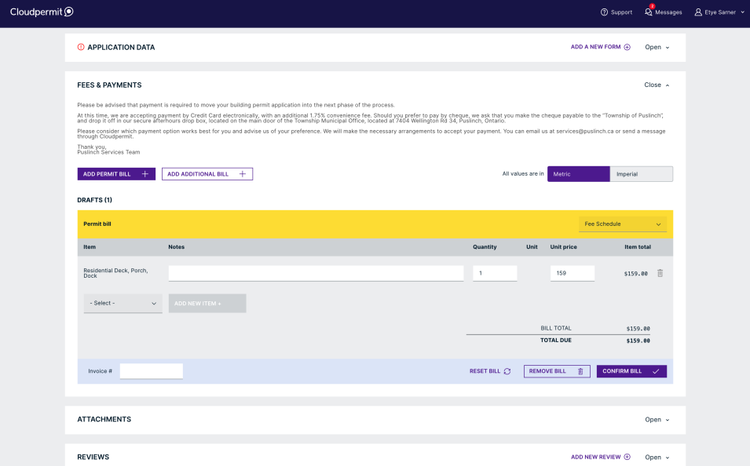
Utility Billing
Utility billing helps you bill customers for utility services, including water, gas, and electricity. The software uses records from meter readings and pairs those records with the billing rate to determine the amount owed.
Meter readings are compared to historical values to determine if anything is out of the norm. For example, if the water meter readings are much higher than normal, there might be a leak in the building. The software will notify you of any anomalies so you can either make repairs or notify the customer of an issue.
Some systems also have a self-service portal that allows customers to pay bills, check account status, and monitor utility usage.
Municipal Accounting
Financial management tools, including basic accounting, financial reporting, and budgeting. The system keeps track of grant funds and their allocation. The spending and allocation of funds are closely monitored to ensure municipal departments stay within budget. Municipal software also creates reports, including the statement of revenue and expenditures, that follow the Governmental Accounting Standards Board (GASB) recommended format.
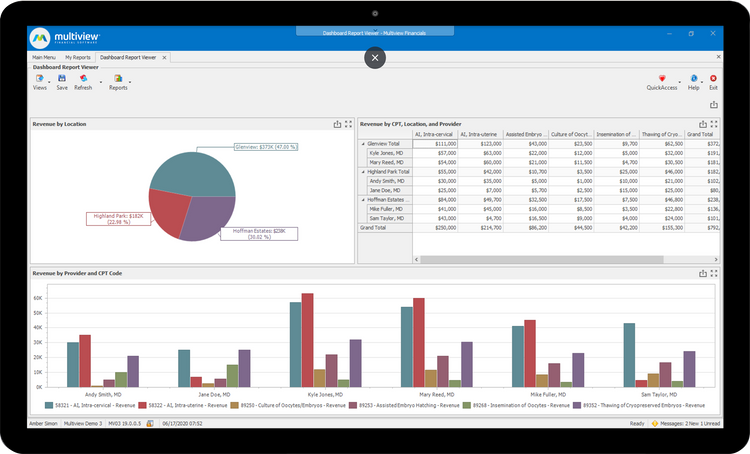
Work Order Management
Municipal software manages work orders to keep tasks organized and make it easy to assign tasks to qualified personnel. It also manages schedules and assigns tasks for routine maintenance on government-owned assets and unexpected repair projects. Work orders can be prioritized based on the urgency or value of the project. Citizens can submit repair and inspection requests through a website or self-service portal. They can also track the status of the project from the portal.
Reports can be created to monitor productivity and outstanding vs. completed work orders. Service history reports can also be generated, so you can see when an asset was last worked on, what materials or equipment was used, and who worked on the project.
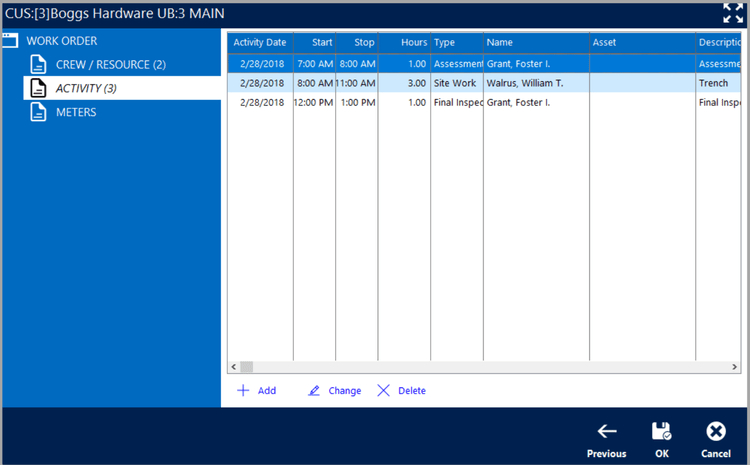
Asset Tracking
Software tracks the location, quantity, value, and condition of equipment, tools, or machinery. It also logs historical data, including the asset’s age and the last maintenance done. Preventative maintenance can be scheduled based on the previous service date to extend the life of the assets. GPS tracking is also included in some municipal solutions. This allows you to view real-time locations of your assets, so you can spend less time tracking them down.
Some assets include:
- Equipment in government-owned buildings
- Fire hydrants
- Bridges
- Streetlights
- Sewage/wastewater pump stations
- City-owned trees
- Parks
Benefits
Municipality software helps you reduce data silos, streamline operations, and ensure better service delivery to residents.
Improved Efficiency
Public works software can improve issue resolution rates. These systems make it much easier to track and manage service requests, maintenance schedules, and work orders. This helps you handle repairs, community services, and inspections promptly, improving response times and resident satisfaction overall.
Smarter Decision-Making
Modern software integrates with geographic information systems (GIS) to deliver a visual representation of infrastructure, assets, and service areas. Whether it’s tracking radio towers or parking facilities, GIS helps you make data-driven decisions about urban development and public safety.
Better Document Management
A built-in document management system helps you digitize and organize everything from tax records to permit applications. This reduces reliance on paper while improving security and accessibility. Plus, local government software supports compliance with local, state, and federal regulations like the Federal Information Security Modernization Act (FISMA).































